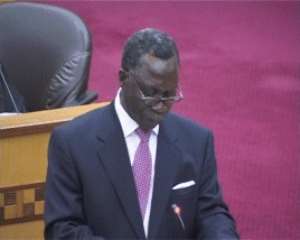
Government says it has put on hold its earlier decision to divest its 46.8 per cent holdings in the Ghana Commercial Bank (GCB) to a strategic investor. Addressing Journalists at a briefing in Accra on Friday, Mr Yaw Osafo-Maafo, Minister of Finance and Economic Planning, said the decision was in conformity with its policy of participatory democracy. "The government, ... decided not to go ahead with its original programme and has put the process for the sale of the shares to a strategic investor on hold." Mr Osafo-Maafo said the programme of divesting the total shares of government has thus been suspended, adding; "in the meantime, government ... will take the necessary measures needed, including some of the recommendations made by the Trades Union Congress, to strengthen the Bank to improve its efficiency, service delivery to society and make it more relevant to the development of the economy. This the NPP government will do". A Technical Committee, chaired by Dr Samuel Nii Ashong, Minister of State in Charge of Finance and Economic Planning, was charged to look into the divestiture of the Bank. It sat for about one month. Mr Osafo-Maafo said the process for change at GCB, could involve a fundamental restructuring of the Bank, utilising the services of Ghanaian and foreign financial management experts and consultants. He said the policy-making body and processes might also be reorganised and the management of the Bank strengthened to give it the needed edge within the financial and banking sector. Mr Osafo-Maafo could not say how long the government would keep the proposed divestiture on hold, but promised: "Everything would be done to protect the interest of the nation." He said details of the entire process would be made available to Ghanaians in "the very near future". He said government has learnt some lessons through the intense public debate, which resulted in the setting up of the working committee. Mr Osafo-Maafo explained that the initiative of government to divest itself of its holding in GCB was geared towards the realization of various objectives including creating a first class bank with the ability to source adequate investment funds locally and internationally and to modernise the Bank into a high-tech, modern financial institution. "It was also to improve customer service delivery, remodel non-profit making branches into micro financing entities if it becomes necessary as well as improving the quality of the Bank's portfolio, which had necessitated bad and doubtful debt provisions of 133 billion cedis in 2001 and the 142 billion cedis for last year." The Minister said that the final decision on GCB must be to facilitate the efficiency and overall growth of the financial sector. Mr Osafo-Maafo said the decision to divest government shares in GCB was to further liberalise the nation's financial sector and reduce government's direct involvement in the operations of the banking system and concentrate on core regulatory and supervisory functions. He said government would examine the Committee's report thoroughly with the recommendations made, especially against the background of the various stands, views and proposals of stakeholders and individual Ghanaians. The strategic investor was expected to keep the entire network of 130 branches in active operation. GCB is the largest bank in Ghana and it is considered the workers' Bank as it has the lowest minimum deposit of 50,000 cedis compared to the prevailing 500,000 cedis and one million cedis, respectively charged by some of the bank's competitors. The Management and Workers of GCB and a large number of Ghanaians including civil society campaigned against the intended sale, citing several instances where such divestitures turned into disasters. The National Democratic Congress (NDC) government initiated the divestiture of the GCB Limited in 1996, which first divested 41 per cent of its shares through an Initial Price Offer and subsequently a 12.2 per cent to the Social Security and National Insurance Trust (SSNIT). "This puts current shareholding structure as 46.8 per cent being 77,233,613 shares for government valued at 60,366,502 dollars and SSNIT's 28,900,620 (17.5 per cent shares) also valued at 22,588,990 dollars. A total of 58,865,767 shares, representing 35.7 per cent with a value of 46,010,025 dollars in the hands of individual Ghanaians at home and abroad. The Minister noted that the initial transaction was to offload the remaining government's 46.8 per cent that would have entailed the closure of 102 of GCB's 130 branches.




 We’ll protect state wealth from opaque deals – Prof Jane Naana
We’ll protect state wealth from opaque deals – Prof Jane Naana
 Mauritania president says running for second term in June polls
Mauritania president says running for second term in June polls
 I won't ever say I was a mere driver’s mate' — Prof. Opoku-Agyemang
I won't ever say I was a mere driver’s mate' — Prof. Opoku-Agyemang
 2024 polls: 'EC struggling to defend credibility'— Prof. Opoku-Agyemang
2024 polls: 'EC struggling to defend credibility'— Prof. Opoku-Agyemang
 Akufo-Addo gov't's 'greed, unbridled arrogance, unrestrained impunity, sheer dis...
Akufo-Addo gov't's 'greed, unbridled arrogance, unrestrained impunity, sheer dis...
 Election 2024: Ghana needs an urgent reset, a leadership that is inspiring – Ma...
Election 2024: Ghana needs an urgent reset, a leadership that is inspiring – Ma...
 Partner NDC to rollout a future of limitless prospects – Prof Jane Naana Opoku-A...
Partner NDC to rollout a future of limitless prospects – Prof Jane Naana Opoku-A...
 NPP will remain in gov’t till Jesus comes — Diana Asamoah
NPP will remain in gov’t till Jesus comes — Diana Asamoah
 Sunyani Technical University demands apology from former SRC president over sex-...
Sunyani Technical University demands apology from former SRC president over sex-...
 'Dumsor' was resolved by Mahama but ‘incompetent' Akufo-Addo has destroyed the g...
'Dumsor' was resolved by Mahama but ‘incompetent' Akufo-Addo has destroyed the g...
